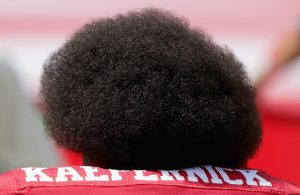Colin Kaepernick’s Grievance
This may be less about Kaepernick, and more about pushing a public showdown between protesters and the NFL.

Colin Kaepernick (Photo by Streeter Lecka/Getty Images)
Colin Kaepernick, the former University of Nevada standout and NFL quarterback for the San Francisco 49ers, gained national attention last year when he began sitting and then kneeling during the national anthem at the beginning of each game. (He explained in an interview that he switched from sitting to kneeling to show more respect to former and current U.S. military members while still protesting.) He was praised by some as being a brave leader taking a public stance on social justice issues. He was derided by others as unpatriotic and for bringing politics into football.
Kaepernick opted out of his contract with the 49ers and became a free agent following the 2016 season after leading the 49ers to win the NFC Championship and Super Bowl in 2012. He then went unsigned with any team through the 2017 offseason and training camps. Some contended that he remained a free agent because of his declining performance, while others argued that he had been blacklisted for his political views expressed on and off the football field.

How Transactional Lawyers Can Better Serve (And Maintain) Their Clients
Many players continued (and continue) Kaepernick’s practice of kneeling during the anthem during the 2017 season. However, on September 22, 2017, President Trump publicly disparaged the protesting NFL players during a rally in Alabama and via Twitter, urging NFL teams to fire such “sons of bitches.” NFL players, owners, and even NFL Commissioner Roger Goodell were initially defiant towards Trump’s remarks.
President Trump, however, continued to harangue team owners and the League over the protests. Vice President Mike Pence left the October 8, 2017, game between the Indianapolis Colts and the 49ers shortly after the anthem, stating that he did not want to “dignify” the protests.
Amid anti-protester backlash, Dallas Cowboys owner Jerry Jones (a well-known supporter of President Trump but who previously knelt and locked arms with members of his team on September 25, 2017, as a sign of unity) then threatened to bench players who “disrespect the flag.” Goodell then sent a letter to all NFL teams stating, “we believe that everyone should stand for the national anthem . . . [and that] the controversy over the anthem is a barrier to having honest conversations and making real progress on the underlying issues.”
On the heels of these recent events, Kaepernick filed a grievance under the terms of the current collective bargaining agreement (CBA) between the NFL and the NFL Players Association on October 15, 2017. The grievance is filed against the NFL and all 32 teams comprising the League.
Sponsored

Generative AI In Legal Work — What’s Fact And What’s Fiction?


The Business Case For AI At Your Law Firm


How Transactional Lawyers Can Better Serve (And Maintain) Their Clients

Generative AI In Legal Work — What’s Fact And What’s Fiction?

According to the grievance, the NFL and all team owners and employees “have entered into and enforced, implied and/or express agreements to specifically deprive Claimant Colin Kaepernick from employment in the NFL . . . for which Mr. Kaepernick is eminently qualified.” The grievance claims that this was done in retaliation for his “leadership and advocacy for equality and social justice.” Additionally: “Respondents have retaliated against Mr. Kaepernick in response to coercion and calculated coordination from the Executive Branch of the United States government.”
The grievance alleges a violation of Article 17 (“Anti-Collusion”) of the CBA which prohibits any team and its employees from colluding to prevent negotiations or employment of a player. Article 17 provides for an award of compensatory damages to a prevailing player. The grievance is brought pursuant to Article 15 of the CBA which requires alleged violations of Article 17 be brought before an arbitrator. Article 15 also contains a provision that all such proceedings are confidential unless the parties agree otherwise. Kaepernick bears the burden of proof under the CBA.
I believe Kaepernick is going to have a tough time in this case. He’s going to need some serious evidence to show actual collusion between the League and/or teams, and the grievance relies only on circumstantial evidence at this point (i.e., he’s statistically a great player, but no one will hire him). I think the respondents have quite a defensible position here because they can cite to very real political and business pressures that weigh against hiring a controversial figure, no matter how good he is. I personally think that the Kaepernick grievance may be less about Kaepernick, and more about keeping the issue alive and pushing a public showdown between the protesters (and their supporters), the League, and team ownership.
We’ll see how all of this plays out. Ultimately, however, I don’t think this is an issue that’s going to die quietly or fizzle out.
Sponsored

Is The Future Of Law Distributed? Lessons From The Tech Adoption Curve

Legal AI: 3 Steps Law Firms Should Take Now
 Evan Gibbs is an attorney at Troutman Sanders, where he primarily litigates employment cases and handles traditional labor matters. Connect with him on LinkedIn here, or e-mail him here. (The views expressed in this column are his own.)
Evan Gibbs is an attorney at Troutman Sanders, where he primarily litigates employment cases and handles traditional labor matters. Connect with him on LinkedIn here, or e-mail him here. (The views expressed in this column are his own.)







